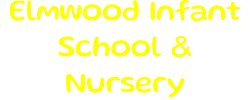
Elmwood Infant and Nursery School provides our pupils with an engaging and inspiring curriculum which extends the children’s interests, responds to their individual needs and meets fully the statutory requirements of the National Curriculum for England.
Our curriculum is underpinned by the National Curriculum (2014). We enhance this with planned opportunities that make up the wider school curriculum. Learning is planned for to provide meaningful contexts for children to enable them to be independent, reflective learners who have a sense of responsibility for their own learning and development.
At Elmwood Infant and Nursery School, we are committed to creating a curriculum which is balanced and broadly based and challenges all children to achieve their full potential. Our curriculum provides a welcoming and supportive learning environment in which all children feel valued and are given opportunities to develop their learning within contexts that reflect their experiences and cultures.
We constantly promote positive partnerships between all children, families, staff, governors and the wider community and encourage our ‘Elmwood community’ to come into school to share experiences and achievements. This is planned for and encouraged by all staff as we believe this has a positive impact on the children’s learning and well-being.
We promote British Values and the spiritual, moral, cultural, mental and physical development of all our pupils through all areas of the curriculum and teach this using SEAL- Social, Emotional Aspects of Learning and also use cross curricular links in order to develop confidence, independence and self- esteem.
The staff at Elmwood endeavour to provide a curriculum that embeds skills to prepare the children for further learning and adulthood by expecting the highest standards of behaviour, achievement and attainment appropriate to each child’s abilities and needs.
In addition to the National Curriculum the school provides a wide range of visits and extra-curricular opportunities plus additional after school activities which include football and multi-skills.
We have a School Council and a Rights Respecting School steering group which provide our children with the opportunity to have a voice and learn to value others, their views and beliefs. (Article 12: The right to say what you think should happen and be listened to.)
In the Early Years Foundation Stage, (Nursery and Reception) the learning and development requirements comprise of
- seven areas of learning and development and the educational programmes which set out what will be covered in each age group.
- the early learning goals, which summarise the knowledge, skills and understanding that all young children should have gained by the end of the Reception year; and
- the assessment requirements (when and how practitioners must assess children’s achievements, and when and how they should discuss children’s progress with parents and/or carers).
The seven areas of learning include: communication and language; physical development; personal, social and emotional development; literacy; mathematics; understanding of the world; expressive arts and design.
Four guiding principles shape our practice. These are:
- every child is a unique child, who is constantly learning and can be resilient, capable, confident and self-assured;
- children learn to be strong and independent through positive relationships;
- children learn and develop well in enabling environments, in which their experiences respond to their individual needs and there is a strong partnership between practitioners and parents and/or carers;
- children develop and learn in different ways and at different rates. The framework covers the education and care of all children in early years provision, including children with special educational needs and disabilities.
